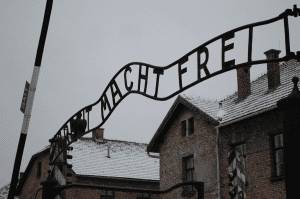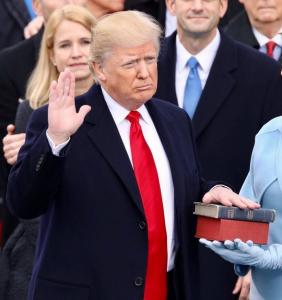Let me begin by saying that I am very sorry that the president, his wife, and several members of his inner circle have tested positive for COVID-19. I find these diagnoses distressing, and especially dangerous for Mr. Trump who, like me, falls into that age group that does not in the main deal well with the invasive virus. His hospitalization at Walter Reed suggests that his doctors are taking no chances with the acute dangers that his health might bring. I find it completely reprehensible that certain antagonists of Mr. Trump have taken the occasion to deride and ridicule him because of his positive test. Any who have read my columns during the time of the Trump presidency know all too well that I have found his leadership almost completely deplorable, based on lack of intellectual curiosity, a denial of genuine expertise, an unstoppable desire to lie boldly and often, and a cruel and bullying behavior that in my mind has badly demeaned the office to which he was elected. Nevertheless, I take no pleasure at all in his diagnosis, and sincerely wish for him, his wife, and his colleagues a speedy and full recovery.
 What I wish to address today is the comparison that many anti-Trumpers have made between the current president and that infamous 12-year dictator of Nazi Germany, Adolf Hitler. This has gone so far as to offer doctored photos of Trump with a tiny moustache and a shock of hair, falling down over his forehead with various phrases uttered by Hitler or his minions placed in the mouth of the president. I find these comparisons invidious, unseemly, and frankly unhelpful for any possibility of real dialogue across the divides of our polarized society. I ask that such memes cease. Adolf Hitler in our time, even after his suicide in the Berlin bunker now 75 years ago, has become the very model of evil and horror, and as such should never be conjured up for human comparison in our or any time. I make this plea for several reasons.
What I wish to address today is the comparison that many anti-Trumpers have made between the current president and that infamous 12-year dictator of Nazi Germany, Adolf Hitler. This has gone so far as to offer doctored photos of Trump with a tiny moustache and a shock of hair, falling down over his forehead with various phrases uttered by Hitler or his minions placed in the mouth of the president. I find these comparisons invidious, unseemly, and frankly unhelpful for any possibility of real dialogue across the divides of our polarized society. I ask that such memes cease. Adolf Hitler in our time, even after his suicide in the Berlin bunker now 75 years ago, has become the very model of evil and horror, and as such should never be conjured up for human comparison in our or any time. I make this plea for several reasons.
As an amateur student of the time of the Nazis in Germany, from 1933 -1945, preceded by Hitler’s rise to prominence and power beginning just after the end of the First World War in 1918, I know quite well the multiple factors that brought Hitler to his seat of dictatorial authority. These included: a harsh Versailles Treaty, strapping Germany with massive reparation demands from the victorious allies, a wild and hedonist Weimar Republic, brought to an abrupt close by the world-wide depression of 1929 and following, along with the sense of German despair and despondency that each and all of those events created. Into that cesspool of pain and anger stepped the army private with the unforgettable voice who promised over and again a return to the glory days of the German empire, days when all Germans could once again hold their heads high among the nations of the world.
Well, not quite all Germans. It turns out that Hitler, for reasons somewhat shrouded in the mists of his early life of relative poverty in Vienna, held a virulent and unremitting hatred for the Jews, and vowed, if ever he had real power, that he would remove all Jews from Germany, and as that power was handed to him, determined that no Jew should anywhere be kept alive. And to the world’s unforgettable horror, his resolve turned to a ferocious reality as at least 6,000,000 Jews, and perhaps even more, were destroyed in ways unthinkable and unimaginable in the camps and ovens of Germany, Poland, and France. And Hitler’s promises for “all” Germans equally did not include any Communists or any Homosexuals or any Gypsies or any persons at all who dared speak against the Leader. And those promises also did include the certainty that all “eastern peoples,” Slavs, Russians, among others, would be starved and eventually annihilated in order to make way for the “pure race” Germans to appropriate their land and feed the master race in perpetuity. Both of these assurances—the destruction of the Jews and the murder and land confiscation of all those east of Germany—were made plain in Hitler’s 1924-25 book, Mein Kampf, or “My Struggle”. Anyone who bothered to read this poorly written mishmash of hatred and bile could not fail to hear what Hitler intended to do if he became Germany’s leader. And as he made hundreds of speeches in the ensuing 8 years leading to his assumption of the Chancellorship of the country in 1933, he rarely failed to trumpet those two central promises loudly and unmistakably.
Here is one way that Hitler is so different than Trump. Mr. Trump rarely, if ever, maintains a clear political goal for long; he “shoots from the hip,” as he is fond of saying, and his “hip” seems ever shifting. This is completely unlike Hitler, who single-mindedly and unwaveringly for the 30 years or so of his public life, focused his attention on the Jews and the need for German living space in the east. All of his serious reading, and he was a serious reader, tended to sharpen and clarify for Hitler these two constant goals. Trump, of course, rarely reads, and if he does, that reading appears to have small effect on his plans or actions. In that way, the two men are so different as to be near polar opposites. This does not mean, of course, that Trump’s actions do not have very negative consequences for many people, from immigrants to environmentalists to people of color. But to say that Trump is “like” Hitler is to say something finally quite meaningless and foolish.
Hitler was in the end a dictatorial tyrant, a man who believed that his word was final and infallible once uttered. I grant that Donald Trump appears to believe something similar about his comments—“I know more than my generals, my intelligence people, my medical advisors;” those claims are well documented—but Hitler made his claims in the midst of a monstrous war, where his decisions brought on the deaths of millions, and made life unlivable for millions more. I think this is more than a matter of degree. Given the US system of government, there remain checks on the most egregious of Mr. Trump’s desires; in wartime Germany all power lay in the hands of Hitler, and no one dared question his decrees. Donald Trump is not Hitler in this way either.
To liken Donald Trump to Adolf Hitler is to stop all conversation in its tracks. It is to claim that one of history’s most storied monsters has risen from the dead and found his way into the White House. This is both wrong and useless. Donald Trump will not be president forever; I for one hope he is in his final days in office. Hitler boasted of a Reich that would last 1000 years, a Jew-free, gigantic German hegemonic beast that would swallow the earth. That Reich barely made it 12 years, but its horrors are with us still. It is my hope that when Mr. Trump returns to his gold-plated bathroom fixtures in his huge Florida home that his impact will be vitiated over the succeeding years of new presidential rule, sooner rather than later, I hope.
We need to stop bringing up Hitler when we speak of Donald Trump. Mr. Trump should be judged on his own merits or demerits, his own successes and failures. He is not Adolf Hitler; he is the 45th president of the USA, and holding him up to his predecessors, to their successes and failures, is what we need to do, using our founding documents as measuring sticks for what he has done and not done. Let us retire Herr Hitler to the dustbin of history where he so clearly belongs.
Note: If you wish to read the best books about the Nazi dictator, the following stand out:
Konrad Heiden, Der Fuehrer, an early and still valuable eyewitness look at Hitler
John Toland, Hitler, the first of many popular biographies, well worth reading still
Ian Kershaw, Hitler, two volumes, an excellent and thorough look at the rise and fall of Hitler
Ulrich Vollker, Hitler, two volumes, the most recent of the full biographies, beautifully translated from its original German
(Images from Wikimedia Commons)











